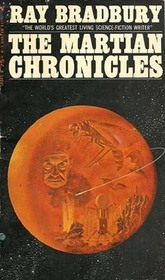Helpful Score: 4
What a strange book! It reminded me a bit of 'The Twilight Zone.' I found this book confusing at first, until I realized that each story was a different perspective of life on Mars with the Martians. The stories having to do with the Martians were by far more interesting than the ones not having much to do with the Martians. Some of the stories dragged on a bit, but not so much so that I couldn't bear to finish the book. I would recommend this Ray Bradbury classic if you like science fiction.
Helpful Score: 3
"The Martian Chronicles" (1950) is vintage Bradbury. It is a series of vignettes (published between 1946 and 1950) about the colonization of Mars from 1999 to 2026: both fantasy and satire. If we cannot tolerate one another on Earth how will we fare on Mars? How will the Martians react to outsiders? Descriptions are full of his typical poetic metaphors, which seem out of place with the sci-fi scenario and his often incoherent banter. Several parts borrow events from stories of other authors. For example, in "And the Moon be Still as Bright," the Martian race have all be decimated by germs brought by three expeditions from Earth (H. G. Wells "The War of the Worlds").
A highlight, to me, is his sketch Usher II," in which a settler (Mr. Stendahl) builds a replica of the Poes House of Usher. References to Earths government banning and burning books, and to an underground society that illegally hoards them, makes this sketch a precursor of his most renown work, "Fahrenheit 451." The house and its dreary landscape are the means by which Stendahl intends to destroy his enemies (the Moral Climate) who have dispatched a representative to dismantle and burn Usher II. In the course of the narrative Bradbury works in reference to the fairy tale "Rapunzel" as a means of accessing the house. Then he has Stendahl destroy his enemies following the plot of several of Poes major stories: "Murders in the Rue Morgue," "The Pit and the Pendulum," "The Premature Burial," "The Cask of Amontillado," and "The Masque of Red Death." Finally, Usher II is destroyed as the original was in "The Fall of the House of Usher."
The final story, "The Million-Year Picnic," brings us back to the beginning: à la "Finnigan's Wake." With some minor substitutions, this book was published in the UK under the title "The Silver Locusts": an obvious metaphor for the space ships that invade and ravage Mars.)
A highlight, to me, is his sketch Usher II," in which a settler (Mr. Stendahl) builds a replica of the Poes House of Usher. References to Earths government banning and burning books, and to an underground society that illegally hoards them, makes this sketch a precursor of his most renown work, "Fahrenheit 451." The house and its dreary landscape are the means by which Stendahl intends to destroy his enemies (the Moral Climate) who have dispatched a representative to dismantle and burn Usher II. In the course of the narrative Bradbury works in reference to the fairy tale "Rapunzel" as a means of accessing the house. Then he has Stendahl destroy his enemies following the plot of several of Poes major stories: "Murders in the Rue Morgue," "The Pit and the Pendulum," "The Premature Burial," "The Cask of Amontillado," and "The Masque of Red Death." Finally, Usher II is destroyed as the original was in "The Fall of the House of Usher."
The final story, "The Million-Year Picnic," brings us back to the beginning: à la "Finnigan's Wake." With some minor substitutions, this book was published in the UK under the title "The Silver Locusts": an obvious metaphor for the space ships that invade and ravage Mars.)
Helpful Score: 3
This was the best sci-fi book I have ever read, and normally I hate sci-fi of any kind (although I love fantasy)! The book was so timeless and original, and really got my brain thinking about dimensions and time-travel. I am so surprised! Although I don't plan on going crazy with this author or genre, it definitely opened up my mind a little more, especially where the genre is concerned.
Helpful Score: 2
If I didnt have two copies, I wouldnt be willing to swap it. It's truly one of my favorites and an awesome collection of short stories by one of the masters.
Helpful Score: 1
A fabulous work that serves as a transition, or pivot point from the "Golden Age" of SF to the modern age -- thoughtful and clever in so many, many ways.




